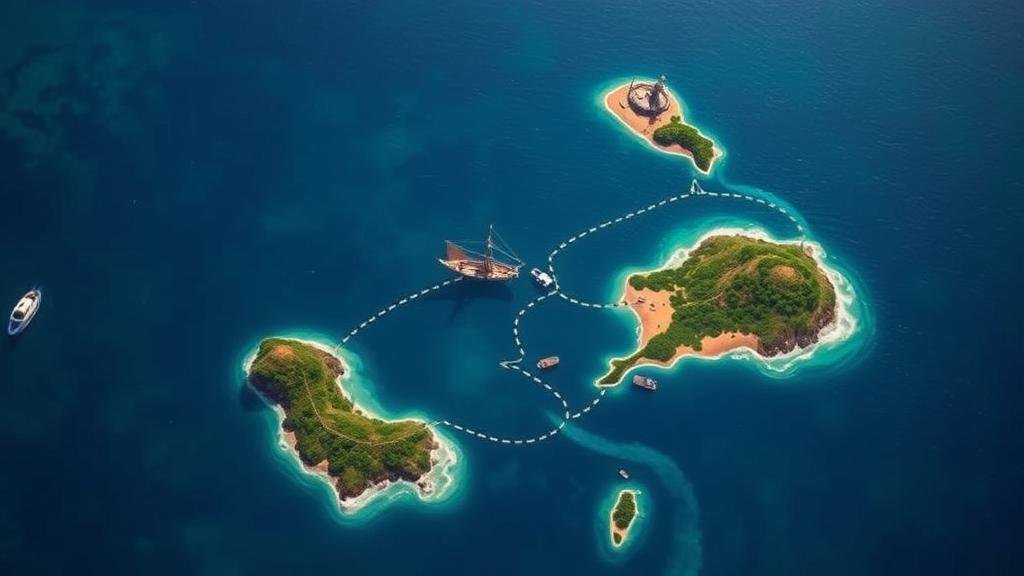Following paths of mythical sea voyages to locate lost island civilizations.
Following Paths of Mythical Sea Voyages to Locate Lost Island Civilizations
Throughout history, tales of lost island civilizations have captivated the imaginations of explorers, historians, and adventure-seekers alike. From Platos account of Atlantis to the Polynesian legend of Mu, these narratives inspire countless quests to uncover hidden truths. This article delves into the historical context, methodologies, and potential modern discoveries surrounding these mythical voyages.
The Allure of Lost Islands
Lost islands symbolize more than mere locations; they represent humanitys innate desire to uncover the unknown. Many of these legendary civilizations, such as Atlantis, reputedly possessed advanced technologies and profound wisdom that are lost to time. The tales often contain geographical hints that guide explorers on their quests.
Historical Context and Famous Legends
The fascination with these lost civilizations dates back to ancient texts. Plato, in his dialogues “Timaeus†and “Critias†around 360 B.C., described Atlantis as a powerful island civilization that was said to have sunk into the ocean after catastrophic events. More recently, the resurgence of interest in lost civilizations garnered attention with the discovery of the island of Santorini, which some believe echoes the demise of Atlantis due to a volcanic eruption around 1600 B.C.
Similarly, the legend of Mu, which originated in the 19th century, describes a lost continent in the Pacific Ocean thought to be home to an advanced civilization. Despite lacking concrete archaeological evidence, the allure of such myths persists, prompting explorations of the oceans depths.
Exploration Methods
Modern explorers utilize a combination of ancient texts, historical maps, and technological advancements to trace paths of mythical sea voyages. Here are some methods employed in the search for lost civilizations:
- Archaeological Research: Underwater archaeology has revealed remnants of ancient cultures, such as the submerged city of Dwarka in India, believed to be associated with the epic Mahabharata.
- Geolocation Technology: Advanced tools like satellite imagery and sonar mapping assist in locating submerged structures or potential landmasses.
- Historical Cartography: Analysis of ancient maps helps in understanding the geographical context in which these lost civilizations existed.
Real-World Applications
The quest for lost civilizations not only satisfies curiosity but also contributes to our understanding of humanitys past. For example, the discovery of the bimini road off the coast of Bahamas, a submerged formation believed by some to be part of Atlantis, has spurred significant archaeological interest. While some dismiss it as a natural formation, the ongoing debates fuel further research into ancient maritime cultures and their connections.
Challenges and Skepticism
Despite the intrigue surrounding these quests, the search for lost islands often encounters skepticism. Critics argue that legendary civilizations are often steeped in myth rather than fact. For example, geologist and historian Dr. John F. Richards has noted that many supposed ancient structures result from natural phenomena and the human propensity to ascribe meaning to these formations.
The challenge lies in distinguishing between folklore and history. Aspects such as rising sea levels and tectonic activity must be considered when evaluating claims of lost civilizations. Also, the interpretation of evidence can be subjective, leading to differing conclusions among researchers.
Actionable Takeaways
For enthusiasts considering their own ventures into this captivating field, here are some actionable steps:
- Study ancient texts and historical maps to gather foundational knowledge about lost civilizations.
- Engage with local archaeological societies to stay updated on discoveries and ongoing research.
- Consider participating in organized dives or explorations that focus on underwater archaeology.
- Use digital platforms and forums to connect with like-minded individuals passionate about uncovering history.
Conclusion
The pursuit of lost island civilizations encapsulates a rich tapestry of mythology, history, and exploration. While skepticism remains a critical aspect of this field, the marriage of modern technology and ancient wisdom offers exciting opportunities for discovery. As adventurers continue to follow the paths laid out by mythical sea voyages, who knows what hidden truths of our past await beneath the waves?


